This is my serialized story of hiking the Mountains-to-Sea Trail (MST), a 1,175-mile route that crosses the state of North Carolina. I’m hiking west from Jockey’s Ridge near Nags Head on the Outer Banks of the Atlantic Ocean to Kuwohi (formerly Clingmans Dome) near the Tennessee border in the Great Smoky Mountains. If you’d like to start at the beginning of my story, click here.
See the Mountains-to-Sea map at the bottom for reference.
The ten-mile hike to the Rockford General Store takes several hours, but it’s a beautiful walk through rolling farmland. Something about actively farmed land that I find very satisfying. Maybe it’s having grown up as a young boy on a farm in Pennsylvania. I am reminded of the phrase ‘you can take the boy off the farm, but you can’t take the farm out of the boy.’ I think I may be living proof of this truism.
Still, I’m glad when around eleven I finally arrive in the small crossroad town of Rockford. The temperature has climbed throughout the morning and I have had to work at staying hydrated, which I must admit is not my nature. But, I am ready to take an hour off, refill my bottles, and buy lunch. In these old-timey stores, like the general store here in Rockford, one never knows what’s for sale, but my hope is that a wide selection of potato chips are shimmering on a shelf near the Snickers.
I am surprised at how small of a community Rockford is. Siloam, where I had an omelete early this morning at the local pizzeria, is a number of closed store-fronts larger. Most surprising when I reach the Rockford General Store, I discover it is closed. I had been looking forward to exploring the store in planning my Segment Six hike. Now here I am. On the locked doors I find no explanation as to why or when the store will reopen—no listing of hours, but also no sense of being shut down for good. It is simply closed—and that’s that.
A number of outside benches line the length of the store, so I take off my pack and sit for awhile. I eat half a bagel I had planned to save for later and a peanut butter and jelly burrito I made for tonight.
The Rockford General Store is really is disappointing, given how far I have walked—twelve miles already this morning. In looking at my printed directions, I assume the MST trail blazers have taken me here for a reason—so far off the beaten path—precisely for this store. I now read that hikers can camp behind the store with the proprietors’ permission, but, at eleven A.M., with the doors shut tight and no other store in town, I can see no point of camping here for the night.
I still have two liters of water thanks to my profound insight in carrying four bottles for this hike. Yesterday I needed all four and now, today, it looks like I’ll need all four again: the next listed water source is at a winery ten miles away.
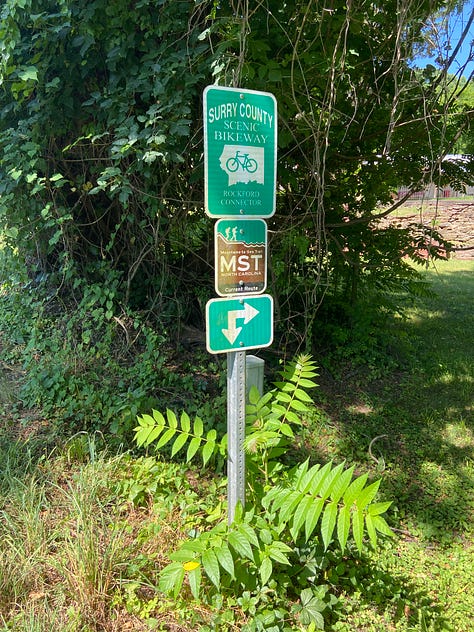
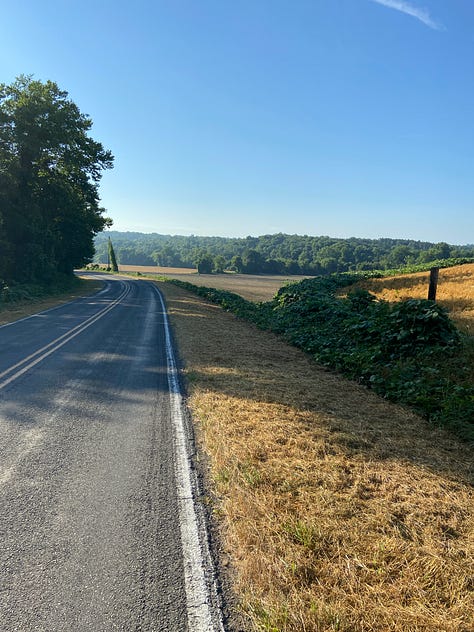
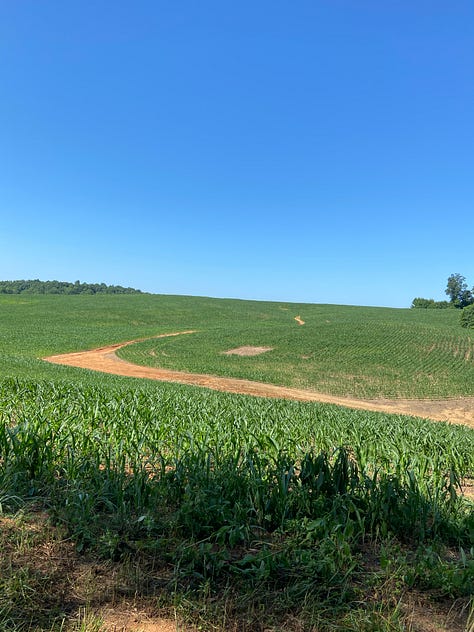
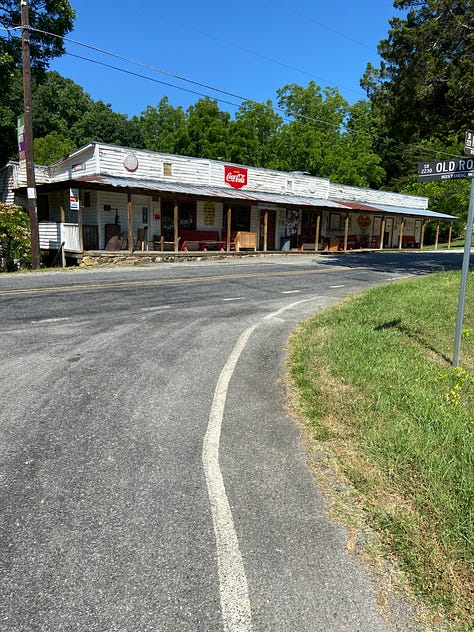


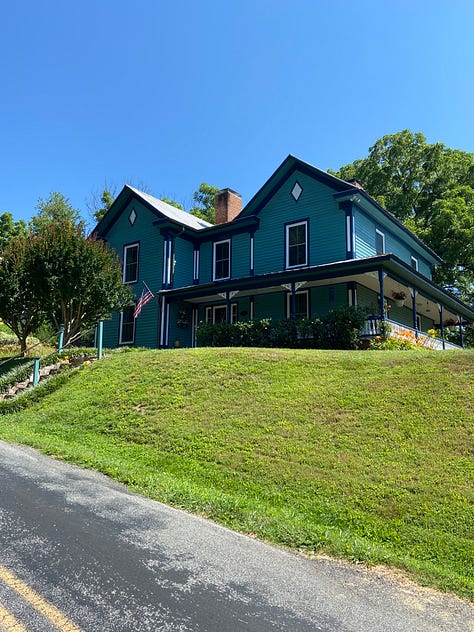

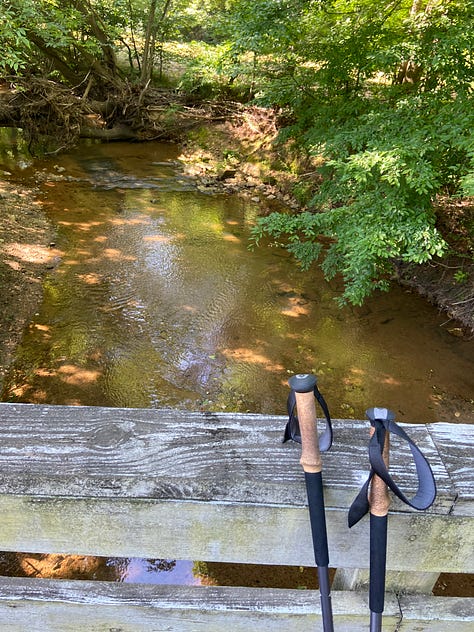
The historic town of Rockford, founded in 1790 along the Yadkin River, looks like it has a number of restored homes with plaques worth reading, but with the heat of the day upon me, I don’t plan to linger. As I put on my backpack, two women stop in a Lexus with New Jersey plates. They get out of the car and take pictures of the store. When I tell them it’s closed, they say they knew this and are simply touring the area.
How could they know? Maybe earlier in my planning, I should confirm if and when these old-timey stores are open. So far my luck has been awful.
Ten miles, I decide, I can do in my sleep. Adding a winery to the endpoint provides an additional incentive. Once there, I could participate in a wine tasting session instead of simply refilling my water bottles. Or I could sip a glass of Chardonnay and chew on peanuts to wait out the heat. How much would it cost me to carry a bottle of wine in my backpack? How much does a bottle weigh, anyway?
I find the first five miles walking through the Yadkin Valley countryside fairly easy, but as I approach the height of the day, my pace slows. I see a winery ahead with vineyards approaching the road, but I know this is too soon to be the one to which I am hiking. Still, seeing vineyards is energizing and I am psyched, that is, until I pass a dead deer along side of the road who has melted in the heat—not a good sign. Maybe, rather, it is a sign that I need to stop and rest.
With five miles still to go, I spot an empty hay wagon parked under a tree along side the road. I go over, take off my pack and sit on the wagon for a good while.
When I lived on a farm in Pennsylvania back when i was a kid, I remember haying and how hot and itchy it was to stack bails coming off the hay bailer. I remember, too, hayrides in the fall at night and how much fun it was to ride on a wagon full of straw with my family and friends—the wagon being pulled by my dad on our tractor. Hay wagons. I haven’t thought of hay wagons in years. We left the farm when my mom and dad separated—their marriage over and the farm to expensive to maintain.
I eat my second protein bar (which I am not into at all, having eaten one in Rockford) and drink most of my third bottle of water before I jump down from the wagon. My focus is not on the road in front of me, though, but back when we left the farm and how hard it was to start over.
A car suddenly stops beside me, with two other cars behind it coming to a complete stop too. A woman opens the front passenger’s window, leans over and hands me a white convenience store bag holding two twelve-ounce bottles of water.
“Here, quick! I passed you walking,” she says, “Hope you can use these.”
This is a stunning moment—I sputter, “Thank you,” as I grab the bag almost being thrown at me and she speeds off with the two other cars close behind. I can’t help but wonder what just happened. The two bottles in the bag, though, are a godsend.
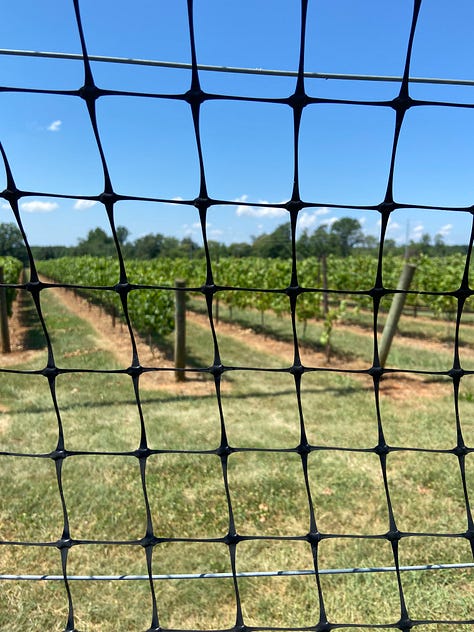
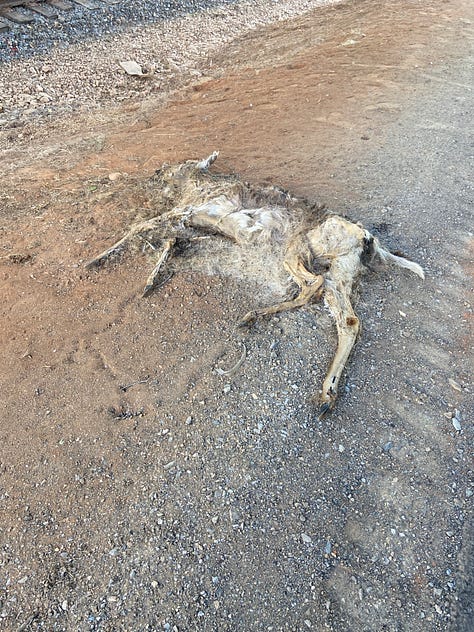

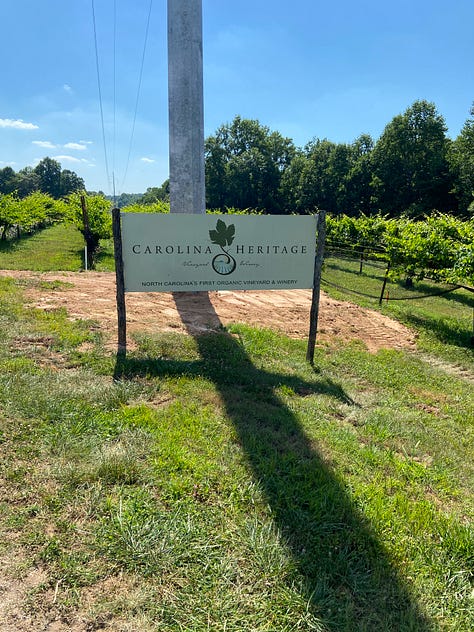
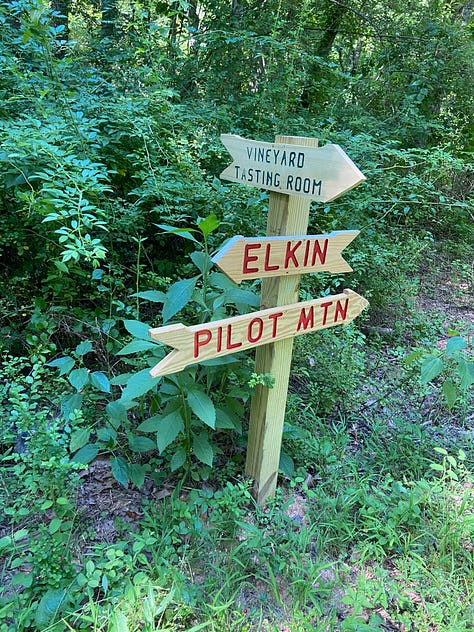
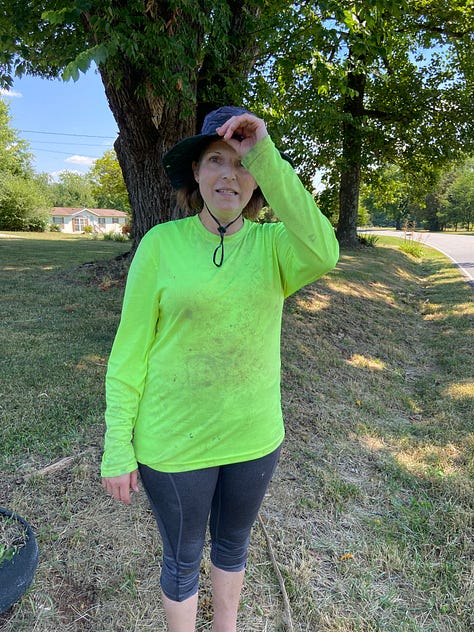
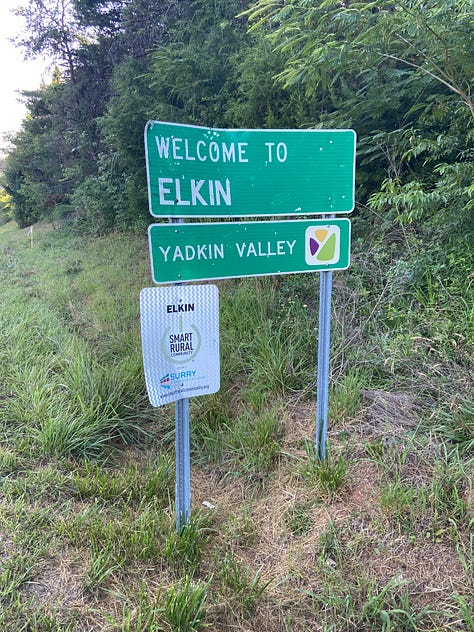
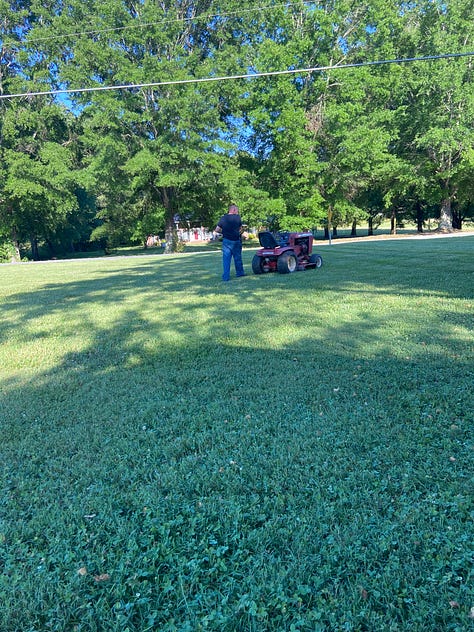
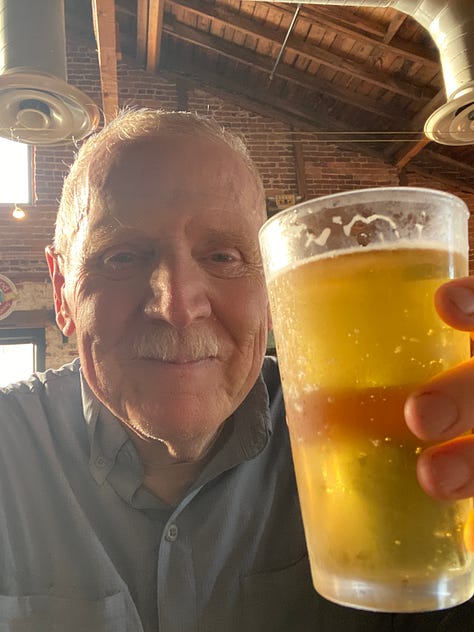
The final miles are tough with the temperature approaching ninety-five degrees. I still have a mile or so to go when my daughter calls me on my cell phone.
“Hey, Dad, are you planning to stop at that winery?” Helen asks.
I say I definitely am. She says she looked it up to see if it is the same winery that offers organic wines, which we really liked back a couple of years ago when we were wine tasting for a weekend in the Yadkin Valley.
“Dad,” she says, “the winery is closed.”
She tells me it is only open on Saturday and Sunday afternoons which, I assume, is when the winery tourism trade is at its peak.
First Rockford and now this! I am devastated. I see my glass of Chardonnay shattering on the road of my dreams. Damn, I was so looking forward to this.
I realize shortly after Helen’s call I need to stop and regroup, but the road I am on is busy with little room for walking along the brim. Then, by chance, I pass a set of steps bathed in shade. The steps are part of a sidewalk that leads to an older, cottage-style home set back from the road. I sit down on the steps and take off my pack. With no need to push through the late afternoon heat to get to the winery, my next goal must be Elkin eight miles away. Right now, though, this idea of this final hike is too daunting to contemplate.
I sit with my head bowed, letting my eyes rest, tired of squinting into the afternoon sun. Willing, in fact, to let the sound of cars and trucks rush by me, barely moving my feet away from the brim of the road.
I am surprised when I hear a car slow down. I look up to see it pull off onto the gravel on the other side of the road from me. The driver lowers her window. “Hey,” she says, pulling back her sun hat, “do you want a warm bottle of water? I just bought half a case at the grocery store. I have frozen popsicles too! The popsicles are sugar free.”
A frozen popsicle here on the road to Elkin? Not a glass of chardonnay or chablis that I have been dreaming about all afternoon, but of all things, a popsicle?
With a steady stream of afternoon traffic flowing past me, I stammer, “Yes, wow, yes, of course. Thank you!” She turns off her car, gets out and rummages around the back. She’s wearing dark leggings and a long-sleeve green tee-shirt. Soon she is running across the road to hand me a warm bottle of water and a frozen popsicle—which she assures me is all natural—no artificial flavoring and no sugar.
I laugh. “At this point in the day,” I tell her, “I suspect I could use the sugar.”
She says her name is Sonya and she has been plowing her father’s fields all day. She stopped at the grocery store on her way home just before seeing me. We chat for awhile about what I’m doing and where I’ve been, then, she tells me about her family—her two older kids back in Winston Salem where she lives, her marriage breaking up, her mother with Alzheimer’s in a nursing home, and her father who recently passed away after a massive heart attack during Covid.
“Wow,” I say, “What a story. You have gone through some hard times.”
She says she has been living at the farm to keep it all going since her dad’s heart attack, but now with her father’s passing and her kids refusing to join her, she thinks she might sell it. She could see herself relocating to a town near the ocean.
“What would you do?” she asks. We both laugh at that.
“Sonya,” I say carefully, “I am the worst person to ask. My folks sold our farm when they separated. I was just twelve, and even though the small town we moved to was great for my mom, my siblings and me—I don’t think we ever got over leaving our farm. Even sixty years later my brothers and sisters and I still talk about it.”
“Yeah, that’s tough,” she says.
“Well, you spent the day on a tractor in this heat.” I respond, “that’s really tough. To me, it isn’t hard to see that you care deeply about what happens to your farm.” I wonder, too, if a home at the beach has been Sonya’s focus all day sitting alone on a tractor plowing row after row in the blazing sun.
I smile and point my wet popsicle stick at her. “I don’t know what you decide, but I am in awe of what you’re doing.”
Standing with Sonya by the side of the road, I am reminded so much of what life is about—the issues everyone faces: marriages and breakups, aging parents, death, children finding their voices as they enter adulthood, family homesteads, even individual wants and desires—it’s all so real.
I see everything through the eyes of a stranger while carrying my own twenty-pound pack, receiving over and over the gift of water from so many good people. In return I play the confessor who momentarily bears the burden or revels in the humanity of the individuals I meet while crossing the state.
I never thought this would be part of my experience in hiking the Mountains-to-Sea trail—it’s certainly not indicated in the printed directions or on the MST website, but this interaction with local people continues to be an ongoing part of my journey.
Soon Sonya must go and we hug—she, with her dirty green work shirt, and me with my white tee-shirt drenched in sweat from walking twenty-two miles—both of us toiling under an unforgiving sun. She has a full night ahead and wants to visit her mother. I, too, have eight miles to go to get to Elkin.
Still, before she drives off, she runs back from her car and hands me a second bottle of water and, most importantly, another frozen popsicle.
I wave to Sonya as she peels away from the side of the road, then lift my pack back onto my shoulders. My right knee is stiff and doesn’t want to continue, but the trail points westward. A little over a mile later I reach the vineyard where the wine shop is closed. The MST directions have me leave the road here and follow a path into the forest. With my achy knee I am not sure I want to take this route, but my options are limited: stay the course on this busy road or head off on a rough trail in the shade.
The two miles on a path that has been cut in the forest above the road turns out to be a good thing. I can see the sharp twists and turns below as the roadway passes through a forested watershed. Given how busy the traffic is at this time of day, I would not want to be walking there. After a mile or so I come up on a bench in the forest and stop, once again. This hike is getting wearisome. Still, I need to reach Elkin and get something to eat. I haven’t had a decent meal since my cheese omelete early this morning. I dream of lifting up a big mug of beer when I get to Elkin. I haven’t drank beer or wine in months, but the image of gulping a cold draft takes hold of my imagination and drives me up off the bench and onward with my hike.
Five more miles back on the main road is a tough assignment. I don’t want to be walking any more today on either road surface or trail. I don’t know how I constantly end up in these situations.
I walk pass several small communities—houses with flags and cars in the driveways. It’s getting near dinnertime and I am down, once again, to my last liter of water. Crazy, but all day today that one liter has remained and now I’m breaking into it.
I spot a man up the way on a mower mowing a large yard, and I wave hello when I get close enough to walk past. This is not unusual. I have passed dozens of people mowing their lawns over the course of this journey. The man waves back, then, turns his mower and drives near me. Now, that’s unusual.
He turns off his mower. “Would you like some water?” he asks. “I have a cooler with a dozen or so bottles inside if you like one.”
This is unbelievable. So many kind people today! I am not sure I need it, but I’ve learned in the course of this trek, never turn down water.
“Yes,” I say. “Yes, this would be wonderful.”
He drives his mower to a shed while I start walking across the yard to meet him. Back he comes on his mower with two bottles on his lap. He stops his mower and hands them to me. They are cold, just like he said they would be, and wet and the water is perfect for drinking in the late afternoon of a hot day. I ask him if I can sit on his grass and he says, “Yes, take a moment. Rest.” I sit down on his freshly cut grass and drink from one bottle while with the other refilling one of my liter bottles in my pack.
He says he saw me from afar and thought I might like the break. Normally his dad mows this lawn, he sad, but this evening he is helping him out with it being so hot and all. I tell him that what he is doing is nice—I bet his father really appreciates it.
My thoughts go to my father who died when I was sixteen five years after we left the farm. Fathers and mothers, how strange to be thinking about them today.
It isn’t long before I get up. I have to keep going, I tell him, I want to get to Elkin in daylight. He says not to worry, it’s just a couple miles ahead. I give him back his bottles, now empty, and shake his hand. “Thank you,” I say. “This really means a lot.”
“You’re welcome,” he says. “Stay safe on your journey and stay hydrated. The mountains aren’t far away now.”
I walk back to the road. Elkin’s ahead and, as the man said, the mountains aren’t far away now. First, though, after a full day in this heat, something to drink other than water would be great.
Click here to read the next chapter.
Click here to read the previous chapter.
Map of the Mountains-to-Sea Trail. This post focuses on Segment 6.




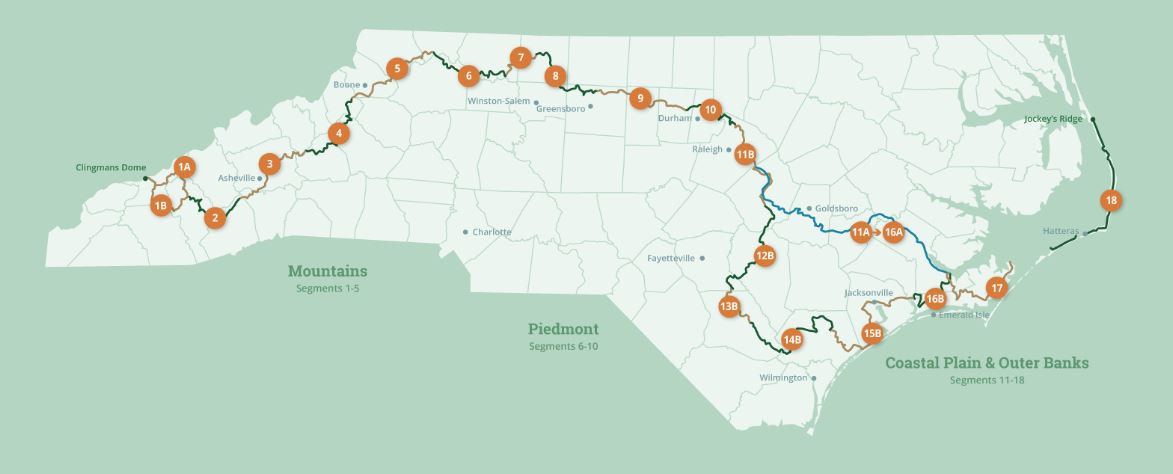
love the way you tell a story Jonathan!
having crossed the same paths )east bound) I love revisiting thru your lense.
Thank you!
Jonathan,
Another great post. This MST adventure has to rejuvenate your hope in humanity. So many trail angels God is sending you along your journey. I am so proud of you; my favorite Camino Beast.
❤️ M